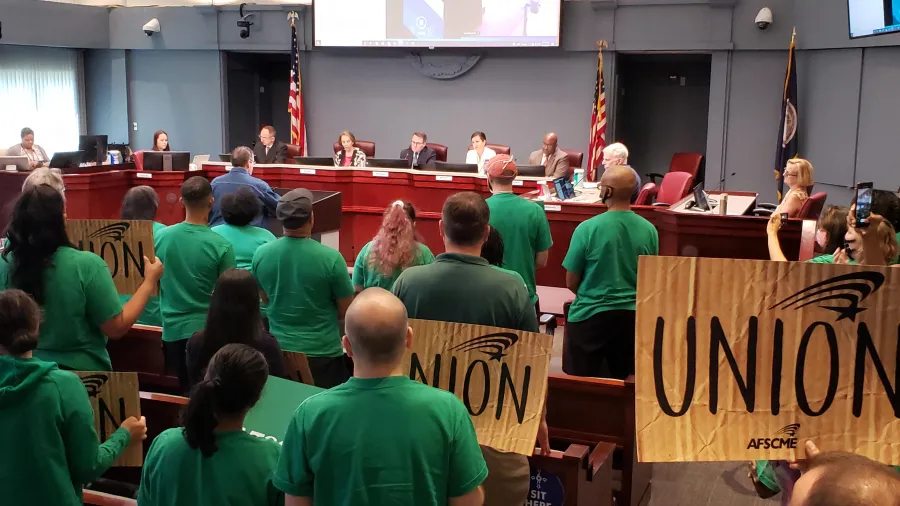Arlington approves collective bargaining for county employees, marking shifting tides on labor in Virginia

The unanimous vote makes the affluent, left-leaning county the second locality to approve the practice in Virginia, a state long known for its opposition to organized labor. After the General Assembly lifted local bans in 2019, the city of Alexandria voted to allow collective bargaining for its employees in April.
“In the public sector especially, you want your employees to be high performers with strong attachment to their work,” said Arlington County Board member Christian Dorsey (D). “Collective bargaining enables that.”
While some county workers already are members of unions, the move will allow those groups to formalize contracts with Arlington officials — an accomplishment that Dorsey called a “win-win”: It will give employees a louder voice, management better channels for communication and residents better county services, he said.
County board members also voted 5 to 0 to adopt a prevailing wage provision to any construction contracts Arlington officials pursue. Under the ordinance, workers on projects that cost the county $250,000 or more must be paid at rates competitive with the private sector.The arrival of collective bargaining to these two D.C. suburbs underscores how Virginia’s political transformation is bringing major changes to this deep-blue swath inside the Beltway, where Democrats have long dominated local politics.
Northern Virginia lawmakers were for decades burdened by the Dillon Rule, a widely used 19th-century policy that says states retain any legal authority not explicitly granted to local governments. The former Republican majority in Richmond, for instance, thwarted Alexandria’s efforts to raise the minimum wage and Arlington’s push to tax single-use plastic bags.After Democrats gained control of both houses of the General Assembly in 2019, they drew the most headlines for their historic efforts to legalize marijuana and end capital punishment. But they also empowered cities and counties to pursue more ambitious, Democratic agendas — from collective bargaining to shedding memorials of and streets named for Confederate leaders.Arlington on Saturday also voted to officially rename Lee Highway, a change approved by the Democratic majority in Richmond after it long had been blocked by Republican legislators. The road will instead bear the name of John M. Langston, an abolitionist who in the 1880s became the first Black congressman elected in Virginia.
The board’s vote Saturday, before a crowd of county employees and union organizers in green AFSCME shirts, will bring collective bargaining back to Arlington County for the first time in nearly half a century.
In 1977, the Virginia Supreme Court put an end to formalized union contracts in Arlington, ruling that the state legislature needed to give the county permission to enter such an agreement. State lawmakers voted in 1993 to ban such contracts entirely.“I’ve seen the changes come and go. This thing about collective bargaining is real and it needs to happen now,” Ingrid Gant, president of the Arlington Education Association, told board members on Saturday morning. As a former Arlington County parks employee, she had worked under a collective bargaining agreement at the start of her career, she said.
Board members on Saturday did not explicitly hash out certain details of the ordinance — including whether to make certain positions, such as fire battalion chiefs, eligible to join unions and when negotiations can start.
While collective bargaining is expected to start by fiscal year 2024, Gant urged them to begin the process before then, saying it was a “slap in my face” for county employees to wait so long to have their voices heard.Still, county board members and labor leaders alike recognized that Saturday marked a monumental shift for Arlington’s approach to labor.
Virginia, like many other states across the South, remains a “right to work” state, which weakens labor unions by preventing them from requiring workers to pay union dues as a condition of employment. Until the General Assembly’s vote in 2019, it was also one of only a handful of states — all in the South — that barred collective bargaining for public-sector employees such as teachers, police officers, and firefighters.
Jim Rodriguez, a county employee and the president of AFSCME Local 3001, which represents county and school employees across northern Virginia, said he was looking forward to formalizing the union’s relationship with county management. The move passed by the county board splits employees up into five distinct bargaining groups that can negotiate specific agreements.“County employees recognize the historic nature of this ordinance, and we are excited to continue the dialogue we have had with county board members to build upon its foundation,” said Rodriguez.Moments before the vote, Board Vice Chair Katie Cristol (D) issued a question — and a challenge — to the General Assembly, daring them to tackle some of the other state’s antilabor provisions.
“Who’s next?” she asked. “I hope that we will see the spirit of collective negotiation that has now come to Arlington County government ripple through the private sector as we seek to create a fair economy for all working people.”
